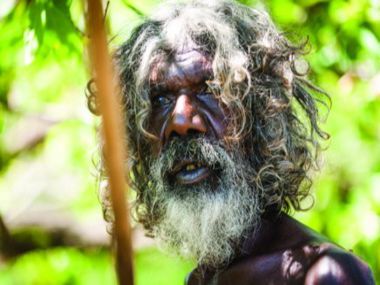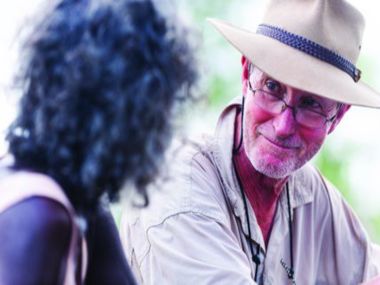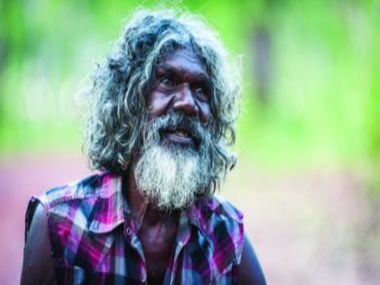GULPILIL'S COUNTRY

David Gulpilil as Charlie the hunter, on his Country
Posted by Jeremy Eccles | 11.07.14
I've often said that the major problem with the Intervention – and all the hyperventilation about the reported spate of child abuse and domestic violence in remote Aboriginal communities that justified the imposition of its quasi-military rule – was that it was all about the consequences not the cause of the problem. And, of course, it assumed that they were the problem, rather than us!
Rolf de Heer and the immortal David Gulpilil – who's now been on our screens since he was 16, 44 years ago – are attempting to show us a few of the causes in Charlie's Country, a semi-autobiographical film co-written by Gulpilil. And, despite Gulpilil's thoroughly justified Best Actor Award in Un Certain Regard section at Cannes this year, it's not a pretty experience and, sadly, it may get much more appreciation around the world than in Australia. Here, there's just so much sympathy-fatigue regarding seemingly intractable Indigenous issues. For, after their earlier collaborations on The Tracker and Ten Canoes, de Heer and Gulpilil have the confidence to tell their story at an Aboriginal pace, via long periods of consideration and lengthy negotiation. But the rest of us simply have to learn about that pace if we're ever going to understand the First Australians and work through all our problems together.
So stick with Charlie's Country. It's not all black and white! For instance, it's not well known that Gulpilil didn't appear in Ten Canoes because he was an exile from his Ramingining community at the time it was filmed for wrong-skin infractions. So, despite his antique appearance – especially in the deep river-beds of wrinkles on Gulpilil's fascinatingly slow-to-change face (which we see a lot of in close-up) - the star is not an Elder in the traditional sense in Yolngu society. And, arguably, it's the white world's destruction of the Elders' authority that is the root cause of all our problems. If people who grew up expecting to pass through all the degrees of initiation and become Big Men have that progression cut away beneath their feet, it's more than likely that they'll exercise what little authority they have left malignly, on the weakest around them – women and children.
Gulpilil has broken the white man's rules too – and was actually in prison as this film was developed, an act of therapy by de Heer. The scene in Charlie's Country where Charlie goes to prison and the wild white locks of hair that engulf and enliven his head are soullessly shaved off, leaving an unrecognisable face (and soul), is riveting viewing. Gulpilil is never thereafter seen in prison other than as a lifeless, impassive carving – more Easter Island or Modigliani than Man.
But, like that equally demanding film, Samson & Delilah, there is a 'happy ending' if you look for it. Having decided that he'd been put in prison “for being an Aborigine”, and having intended to stay in dangerous Darwin and try to straddle racial boundaries, Charlie does return to Ramingining and accepts the responsibilities that attach to his seniority – partly because all the other Elders are sickening and being 'taken away' to Darwin to die, away from Country...a recurring theme throughout the film. At the end we see him positively recalling his Big Moment when he danced for the Queen at the opening of the Sydney Opera House – and Gulpilil was a magnificent dancer, still moving moving his old bones with lithe muscles – and motivating young community scallywags to immerse themselves in the essence of traditional ceremony...dance, body-painting and music.
His crumpled photograph of that Big Moment has earlier been sad evidence of Charlie's Fall from Grace.
But it's accompanied him throughout – as the white assimilationist bureaucracy imposes regulation after regulation that deny him his rights as a man “born not found in my Country”, as a hunter not a “recreational shooter” and – most importantly – as the owner of the land on which roads, police stations, government housing and all those rules have been imposed.
Not that the solution is a total denial of changing times. Charlie tries to go bush and live the old life – but soon finds that the ancestors who once painted his remote rock-shelter don't actually come to his aid as the rains fall, the bush supermarket that he'd relied on to replace all that shitty white food that's wrecking his people's kidneys turns out to have empty shelves, and he almost dies. Now it's his turn to be transported to Darwin. Hospital saves his life; but for a tribal man in the big city, the only place to go is the 'long grass', where his one favourable encounter with white regulation – the fact that he's not a “banned person” in the NT when it comes to buying booze – leads inevitably to his downfall.
Ironically, the man selling him booze is actor Gary Sweet, who once played the copper whom Gulpilil as The Tracker wreaked his revenge on in the film of that name. Now, perhaps, he's getting his own back! Rolf de Heer works with families of colleagues like that – both black and white. It's undoubtedly what allows him to go out on a limb with each film he makes. He's been known to fall off. In Charlie's Country he gets inside a problem that few are even prepared to acknowledge exists.
The film opens next Thursday across Australia.
Share this:
»  del.icio.us
»
del.icio.us
»  Digg it
»
Digg it
»  reddit
»
reddit
»  Google
»
Google
»  StumbleUpon
»
StumbleUpon
»  Technorati
»
Technorati
»  Facebook
Facebook
Contact Details

Director Rolf de Heer working with Gulpilil on 'Charlie's Country'

A roguish Charlie - animated by award-winning actor, David Gulipilil - in the film
Further Research
Artists: David Gulpilil
News Tags: Cannes Film Festival | Charlie's Country | David Gulpilil | Jeremy Eccles | Rolf de Heer | the Intervention
News Categories: Event | Media | News | Other Event
Exhibition Archive
- 10.10.17 | TARNANTHI 2017
- 11.08.17 | Natsiaas 2017
- 20.07.17 | APY ART DOMINATES THE WYNNE
- 17.07.17 | Anangu Artist Wins $100,000 Prize
- 14.07.17 | The End of AAMU
- 11.07.17 | ART ACROSS THE COUNTRY
- 11.07.17 | TARNANTHI IN OCTOBER
- 05.07.17 | TJUNGUṈUTJA - from having come together
- 13.06.17 | Ghost-Nets Straddle the World
- 07.06.17 | Grayson Perry Going Indigenous?
- 05.06.17 | Barks Bigger than Ben Hur
- 27.05.17 | NGA QUINQUENNIAL 2017
- 21.05.17 | Blak Douglas Finds Home at the NGA
- 21.05.17 | BRIAN ROBINSON WINS HAZELHURST WOP
- 18.05.17 | PARRTJIMA 2.0
Advertising

